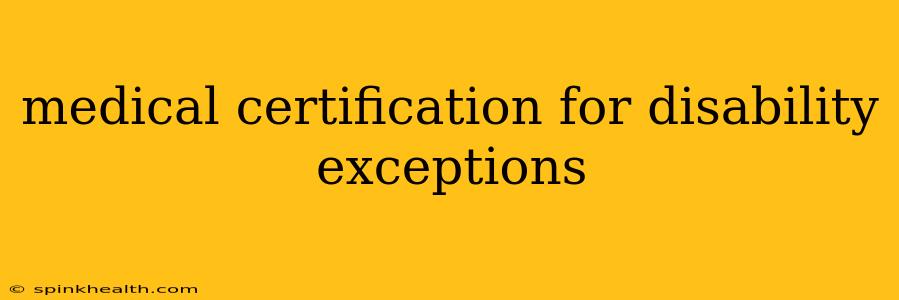The journey towards securing a disability exception often feels like navigating a labyrinth. It's a complex process requiring meticulous documentation, clear communication, and a deep understanding of the specific requirements. This journey begins with the crucial step of obtaining the correct medical certification. This isn't simply a doctor's note; it's a comprehensive assessment that substantiates your claim and helps you access necessary accommodations or exemptions.
Let's unravel this process step-by-step, addressing common questions and concerns along the way.
What types of medical certifications are needed for disability exceptions?
The type of medical certification required depends heavily on the specific exception you're seeking. Imagine Sarah, a student needing an extended deadline for an assignment due to a chronic illness. Her certification would differ significantly from John, a worker requiring a modified work schedule because of a physical disability. Some exceptions require a simple statement confirming the disability's existence and its impact on the specific task. Others demand detailed assessments outlining limitations, recommended accommodations, and a prognosis. Always check with the relevant institution or organization to understand their precise requirements. They may provide specific forms to use.
What information should a medical certification for a disability exception include?
A robust medical certification goes beyond a simple diagnosis. It needs to paint a complete picture of your condition's impact on your ability to fulfill specific requirements. This includes:
- Diagnosis: A clear and precise diagnosis from a qualified medical professional.
- Functional Limitations: A detailed description of how your disability limits your ability to perform tasks relevant to the exception you're requesting. For example, if you're seeking a parking permit, the certification should specify your mobility limitations.
- Prognosis: A statement regarding the expected duration of the disability and its potential impact in the future.
- Recommended Accommodations: Specific, actionable recommendations from the physician on how the situation can be reasonably accommodated.
- Doctor's Contact Information: Ensuring easy verification of the certification's authenticity.
How do I find a doctor who can provide this certification?
Finding the right medical professional is crucial. Ideally, you want a physician familiar with your specific condition and its impact on your daily life. Your primary care physician is often a good starting point. If your condition is specialized (e.g., a neurological disorder), you may need a specialist like a neurologist to provide the necessary assessment. It is important to discuss your needs clearly and ensure the doctor understands the specific requirements of the certification process.
What if my doctor is unwilling or unable to provide the necessary certification?
This is a challenging situation, but several options may exist. You could seek a second opinion from another medical professional specializing in your condition. Transparency is key. If your doctor can't provide the needed information, ask why and explore if another healthcare professional could help.
Can I use old medical records instead of a new certification?
While existing medical records might provide some relevant information, most organizations require recent documentation. Outdated records may not accurately reflect your current condition and its impact. It’s always best to obtain a current assessment that addresses the specific requirements of your exception request.
What are the legal implications of falsifying a medical certification?
Falsifying medical documentation carries significant legal consequences, including potential criminal charges and penalties. Integrity is crucial throughout this process. Always work with qualified healthcare professionals to obtain accurate and truthful certifications.
Remember, navigating this process takes time and patience. Clearly communicating your needs to healthcare professionals and the organization requiring the exception will help you successfully obtain the necessary medical certification and move forward. By gathering the necessary information and working collaboratively, you can increase the likelihood of a positive outcome.

